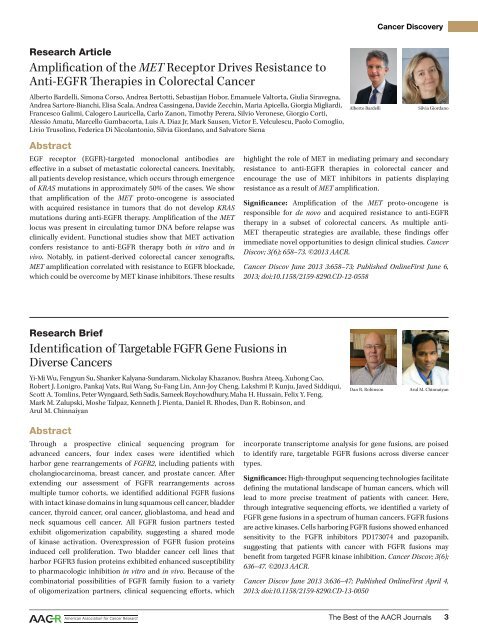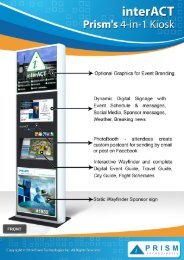Best of AACR Journals
Create successful ePaper yourself
Turn your PDF publications into a flip-book with our unique Google optimized e-Paper software.
Cancer Discovery<br />
Research Article<br />
Amplification <strong>of</strong> the MET Receptor Drives Resistance to<br />
Anti-EGFR Therapies in Colorectal Cancer<br />
Alberto Bardelli, Simona Corso, Andrea Bertotti, Sebastijan Hobor, Emanuele Valtorta, Giulia Siravegna,<br />
Andrea Sartore-Bianchi, Elisa Scala, Andrea Cassingena, Davide Zecchin, Maria Apicella, Giorgia Migliardi,<br />
Francesco Galimi, Calogero Lauricella, Carlo Zanon, Timothy Perera, Silvio Veronese, Giorgio Corti,<br />
Alessio Amatu, Marcello Gambacorta, Luis A. Diaz Jr, Mark Sausen, Victor E. Velculescu, Paolo Comoglio,<br />
Livio Trusolino, Federica Di Nicolantonio, Silvia Giordano, and Salvatore Siena<br />
Alberto Bardelli<br />
Silvia Giordano<br />
Abstract<br />
EGF receptor (EGFR)-targeted monoclonal antibodies are<br />
effective in a subset <strong>of</strong> metastatic colorectal cancers. Inevitably,<br />
all patients develop resistance, which occurs through emergence<br />
<strong>of</strong> KRAS mutations in approximately 50% <strong>of</strong> the cases. We show<br />
that amplification <strong>of</strong> the MET proto-oncogene is associated<br />
with acquired resistance in tumors that do not develop KRAS<br />
mutations during anti-EGFR therapy. Amplification <strong>of</strong> the MET<br />
locus was present in circulating tumor DNA before relapse was<br />
clinically evident. Functional studies show that MET activation<br />
confers resistance to anti-EGFR therapy both in vitro and in<br />
vivo. Notably, in patient-derived colorectal cancer xenografts,<br />
MET amplification correlated with resistance to EGFR blockade,<br />
which could be overcome by MET kinase inhibitors. These results<br />
highlight the role <strong>of</strong> MET in mediating primary and secondary<br />
resistance to anti-EGFR therapies in colorectal cancer and<br />
encourage the use <strong>of</strong> MET inhibitors in patients displaying<br />
resistance as a result <strong>of</strong> MET amplification.<br />
Significance: Amplification <strong>of</strong> the MET proto-oncogene is<br />
responsible for de novo and acquired resistance to anti-EGFR<br />
therapy in a subset <strong>of</strong> colorectal cancers. As multiple anti-<br />
MET therapeutic strategies are available, these findings <strong>of</strong>fer<br />
immediate novel opportunities to design clinical studies. Cancer<br />
Discov; 3(6); 658–73. ©2013 <strong>AACR</strong>.<br />
Cancer Discov June 2013 3:658–73; Published OnlineFirst June 6,<br />
2013; doi:10.1158/2159-8290.CD-12-0558<br />
Research Brief<br />
Identification <strong>of</strong> Targetable FGFR Gene Fusions in<br />
Diverse Cancers<br />
Yi-Mi Wu, Fengyun Su, Shanker Kalyana-Sundaram, Nickolay Khazanov, Bushra Ateeq, Xuhong Cao,<br />
Robert J. Lonigro, Pankaj Vats, Rui Wang, Su-Fang Lin, Ann-Joy Cheng, Lakshmi P. Kunju, Javed Siddiqui,<br />
Scott A. Tomlins, Peter Wyngaard, Seth Sadis, Sameek Roychowdhury, Maha H. Hussain, Felix Y. Feng,<br />
Mark M. Zalupski, Moshe Talpaz, Kenneth J. Pienta, Daniel R. Rhodes, Dan R. Robinson, and<br />
Arul M. Chinnaiyan<br />
Dan R. Robinson<br />
Arul M. Chinnaiyan<br />
Abstract<br />
Through a prospective clinical sequencing program for<br />
advanced cancers, four index cases were identified which<br />
harbor gene rearrangements <strong>of</strong> FGFR2, including patients with<br />
cholangiocarcinoma, breast cancer, and prostate cancer. After<br />
extending our assessment <strong>of</strong> FGFR rearrangements across<br />
multiple tumor cohorts, we identified additional FGFR fusions<br />
with intact kinase domains in lung squamous cell cancer, bladder<br />
cancer, thyroid cancer, oral cancer, glioblastoma, and head and<br />
neck squamous cell cancer. All FGFR fusion partners tested<br />
exhibit oligomerization capability, suggesting a shared mode<br />
<strong>of</strong> kinase activation. Overexpression <strong>of</strong> FGFR fusion proteins<br />
induced cell proliferation. Two bladder cancer cell lines that<br />
harbor FGFR3 fusion proteins exhibited enhanced susceptibility<br />
to pharmacologic inhibition in vitro and in vivo. Because <strong>of</strong> the<br />
combinatorial possibilities <strong>of</strong> FGFR family fusion to a variety<br />
<strong>of</strong> oligomerization partners, clinical sequencing efforts, which<br />
incorporate transcriptome analysis for gene fusions, are poised<br />
to identify rare, targetable FGFR fusions across diverse cancer<br />
types.<br />
Significance: High-throughput sequencing technologies facilitate<br />
defining the mutational landscape <strong>of</strong> human cancers, which will<br />
lead to more precise treatment <strong>of</strong> patients with cancer. Here,<br />
through integrative sequencing efforts, we identified a variety <strong>of</strong><br />
FGFR gene fusions in a spectrum <strong>of</strong> human cancers. FGFR fusions<br />
are active kinases. Cells harboring FGFR fusions showed enhanced<br />
sensitivity to the FGFR inhibitors PD173074 and pazopanib,<br />
suggesting that patients with cancer with FGFR fusions may<br />
benefit from targeted FGFR kinase inhibition. Cancer Discov; 3(6);<br />
636–47. ©2013 <strong>AACR</strong>.<br />
Cancer Discov June 2013 3:636–47; Published OnlineFirst April 4,<br />
2013; doi:10.1158/2159-8290.CD-13-0050<br />
The <strong>Best</strong> <strong>of</strong> the <strong>AACR</strong> <strong>Journals</strong> 3



